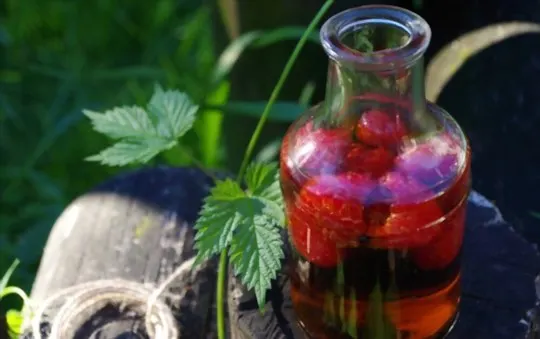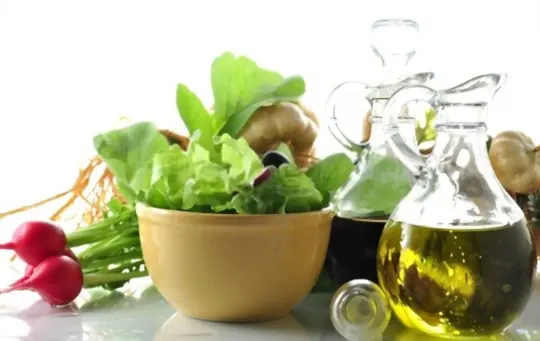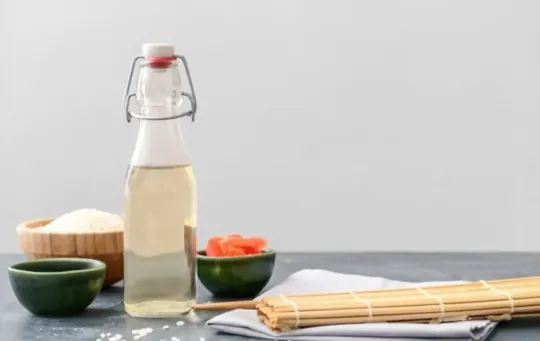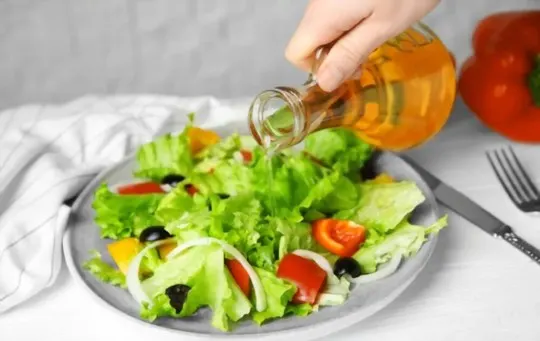In our kitchens, there’s always that one ingredient we run out of at the worst possible time.
Raspberry vinegar is a prime suspect. It’s like, you’re halfway through a recipe, boom, no more of that tart, fruity goodness.
Now, instead of dropping everything and sprinting to the store, we’ve got some genius swaps for you.
Apple cider vinegar? Yeah, it brings a similar zesty kick. Red wine vinegar? Also a winner, with a bit of added sweetness.
These substitutes aren’t just stand-ins; they could even bump your dish to the next level.
Trust us, with these tips, your salad dressings and marinades are about to get a major upgrade. No raspberry vinegar? No problem.

The 5 Best Substitutes for Raspberry Vinegar
If you’re a fan of raspberry vinegar, you know that it’s not always easy to find.
This unique ingredient can make or break a dish, so it’s essential to have a good substitute on hand.
Here are the five best substitutes for raspberry vinegar:
1 – Champagne Vinegar

Champagne vinegar is a variety of vinegar made from Champagne.
The flavor is tart and acidic.
It can be used in cooking to add flavor to dishes.
It can also be used as a marinade for meats or vegetables.
Champagne vinegar can also be used to make salad dressing.
The acidity of the vinegar helps to tenderize the vegetables.
When using Champagne vinegar in cooking, it is important to remember that a little goes a long way.
Too much vinegar can make food taste sour.
Champagne vinegar is a versatile ingredient that can be used in many different ways.
It is an excellent choice for adding flavor to dishes or for making salad dressing.
2 – Rice Vinegar

Rice vinegar is a popular ingredient in Asian cuisine and has a milder flavor than other types of vinegar.
It is made by fermenting rice wine, which gives it a slightly sweet taste.
Rice vinegar can be used in many different dishes, such as salad dressings, sushi, and stir-fries.
It can also be used as a marinade for meats or vegetables.
When shopping for rice vinegar, look for one that is labeled “unseasoned” or “mild”.
This vinegar has a less intense flavor and is less likely to overwhelm the flavor of other ingredients.
Vinegar that is labeled “seasoned” or “strong” usually has a more intense flavor and should be used sparingly.
3 – Sherry Vinegar

Sherry vinegar is a type of vinegar made from sherry, a fortified wine.
It has a dark color and a complex, intense flavor that is sweet and sour.
Sherry vinegar is often used in cooking to add depth of flavor to dishes.
It can be used in marinades, sauces, and dressings or sprinkled on foods as a finishing touch.
When shopping for sherry vinegar, look for a bottle that is labeled “aged” or “solera-aged”.
This vinegar has been aged for at least two years and will have a richer flavor than younger vinegar.
Aged sherry vinegar can also be quite expensive, so it is worth checking the price before you buy.
4 – Apple Cider Vinegar

Apple cider vinegar is a type of vinegar made from fermenting apples.
The end result is a tart, acidic liquid with a strong apple flavor.
Apple cider vinegar can be used in cooking in much the same way as other types of vinegar.
It can be used to add acidity to dishes or used as a marinade.
It can also be used to make pickles or added to salads.
When using apple cider vinegar in cooking, it is essential to remember that a little goes a long way.
The intense flavor of vinegar can easily overwhelm other flavors in a dish.
As a result, it is best to start with small amounts and then increase the amount to taste.
5 – White Wine Vinegar

Most vinegar contains about 5% acetic acid, giving it its signature sour taste.
White wine vinegar, as the name suggests, is made from white wine.
The fermentation process converts the sugars in the wine into alcohol, and then bacteria turn the alcohol into acetic acid.
The result is vinegar with a light, fruity flavor and a slightly acidic taste.
White wine vinegar can be used in various ways, including as a salad dressing or marinade.
It can also be used to deglaze a pan or add flavor to cooked vegetables.
When cooking with white wine vinegar, it is essential to remember that its acidity can cause it to evaporate quickly.
As a result, it is best to add it near the end of the cooking process.

Leave a comment